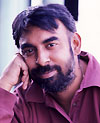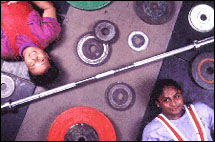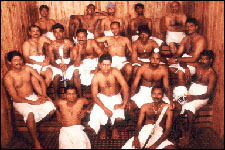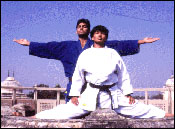|

By Rohit Brijnath |
|
|

By Rohit Brijnath |
|
![]() sk boxer Jitender Kumar, Commonwealth
Games silver medallist, why he boxes for India, what he wants. "Respect,
recognition, money." Not much to ask for, you think. It is.
sk boxer Jitender Kumar, Commonwealth
Games silver medallist, why he boxes for India, what he wants. "Respect,
recognition, money." Not much to ask for, you think. It is.
Respect, recognition and money
Ask Dhanraj Pillai about respect. At half-time during September's Commonwealth Games match against England, this dazzling blur in India blue is upbraided in front of his team by the Indian Hockey Federation (IHF) secretary K. Jyothikumaran for missing chances. Pep talk, Indian style. Later, his head swimming with anger, Pillai thought, "I will retire. I want to play with respect, not this."
Ask Gurcharan Singh about recognition. The boxer, winner of a gold medal in Cuba this year, snorts when you ask him if he's ever signed an autograph. "Arre, people don't even know who I am."
Ask the foreign coaches about money. Says rowing coach, Ukranian Dmitri Riabourkha: "In my country they give $50,000 (Rs. 21 lakhs) for an Olympic gold medal, here it is Rs. 5 lakh. And just Rs. 1 lakh ($2,400) for an Asian gold medal. Not good."
Ask Jitender now whether he has the respect, recognition and money that he craves, and he laughs and says, "Cricketers have ruined everything."
Anonymous tales of heroism
In Patiala and in Bangalore, where the training camps for the Asian Games are being held, as dawn breaks you can hear the sounds of heroism through the early morning mist.
The clank of iron as K. Malleswari heaves 100 kg over her head, then drops it, then lifts it, again and again and again, her hands a mask of blisters.
The rasp of flesh on leather as Jitender pounds the bag, 80-90 punches a second, blanking out thoughts of his schoolteacher mother who cringes at his profession.
Judoka Kamala Rawat, 48 kg, is as fresh and as delicate as the morning dew. Then she proffers her fingers and you recoil, for they are bent into some arthritic nightmare. "Some break," she says with a child's smile, "some dislocate during practice, but we tape them and carry on."
What is promised here is only this: pain. Gnawing ceaselessly at the body.
 Athletes
know that sport is cruel. No one cares if your father is ill or your muscles ache;
when the bell rings and the moment arrives, sport demands an almost impossible
confluence of technique, strength and self-belief. You cannot recall a fired bullet,
plead for another shot at goal or rewind that missed smash.
Athletes
know that sport is cruel. No one cares if your father is ill or your muscles ache;
when the bell rings and the moment arrives, sport demands an almost impossible
confluence of technique, strength and self-belief. You cannot recall a fired bullet,
plead for another shot at goal or rewind that missed smash.
Or as training expert Alexander Krassilchtchikov puts it: "Winning medals is not just about pain. It's about dying."
At the 1994 Hiroshima Asian Games, Mansher Singh was tied with three others for second place. A silver medal dangled in the distance.
Then, maybe it was a gust of wind or a finger that shook, he missed and his world collapsed. "One moment you can feel your adrenaline pumping, the next moment you get a shock to the nervous system."
Now in the gym and in the range, he pushes himself to the extreme - however exhausted, he will come through. Every day he tells himself, "I want that medal bad." So it goes on.
Three times a day, six hours a day, they lift, heave, punch, duck, run, throw, shoot.
 Everyone has a
story. Malleswari, married for two years, hasn't seen her husband for more than 10 days.
Farmer Chikkappa Rai, who lives in Puthur, Karnataka, hasn't seen his weightlifter son
Satish's Commonwealth Games medal because he hasn't come home yet. Gulab Chand,
who has a day job as a head train ticket collector, runs 255 km on tough weeks hoping
one day to hold a 5000m medal and break through the shackles of anonymity.
Everyone has a
story. Malleswari, married for two years, hasn't seen her husband for more than 10 days.
Farmer Chikkappa Rai, who lives in Puthur, Karnataka, hasn't seen his weightlifter son
Satish's Commonwealth Games medal because he hasn't come home yet. Gulab Chand,
who has a day job as a head train ticket collector, runs 255 km on tough weeks hoping
one day to hold a 5000m medal and break through the shackles of anonymity.
It is all so heroic, but it is also terribly tragic. Kunjarani and Malleswari, who between them have brought home 43 World Cup medals, don't even rate a personal masseur to unknot their muscles.
When new judo mats arrive months late in Patiala, coach Nusratkhon Valiev and his team wash the floor and the mats themselves.
Boxing coach G. S. Sandhu says, "At the Kuala Lumpur Commonwealth Games, our opponents had tapes of Jitender's every fight (he lost in the final), we had none of theirs." The video camera is still a foreign object to our athletes.
There is nothing to do at the camp but train, sleep, eat, train. Routine is an athlete's ally, discipline his best friend, yet every now and then he needs to compete abroad. To assess if his training is productive, athletes, like violins, need to be tested and tuned, but only under the tense conditions of competition. Where blood pressure shoots up, nerves jangle and adrenaline pumps.
The coaches fume, for in Bangkok, India will have too many raw, untested teams. The rowers flew off to their year's first international competition only in November. Malleswari hasn't lifted a weight outside Indian shores this year, and a judo outing to Canada in October was cancelled. "Not by me," ruefully smiles Valiev, "but by officials."
Hockey has gone blind
 Officials haven't
inhaled the truth that India is being left behind. Hockey has just
gone blind. Like a once-beautiful woman choosing to be oblivious to the havoc
time has wreaked on her, Indian hockey has refused to acknowledge and arrest
its decline. Beaten by Malaysia at the Commonwealth Games, new coach M. K. Kaushik
begged for a two-month, non-stop camp through October-November.
Officials haven't
inhaled the truth that India is being left behind. Hockey has just
gone blind. Like a once-beautiful woman choosing to be oblivious to the havoc
time has wreaked on her, Indian hockey has refused to acknowledge and arrest
its decline. Beaten by Malaysia at the Commonwealth Games, new coach M. K. Kaushik
begged for a two-month, non-stop camp through October-November.
Fitness levels, for a start, were frightening. Tests carried out on 44 national players prior to the Commonwealth Games rated 16 as good, 24 average, and 4 below average. Says a sports scientist at Bangalore's Sports Authority of India centre: "This is by national parameters. By international standards, they're all average."
Kaushik never got the camp he wanted. After a week-long debriefing session, skipped by several senior players, the players dispersed to play domestic tournaments. A squad of 29 regrouped only to be divided again, with half the squad flying to a pre-Asian Games tournament in Bangkok, while half the team stayed back with Kaushik.
Maybe Indian sports officials who make these bizarre decisions should one morning cancel their air-conditioned meetings, take off their suits, put on shorts and walk on the playing fields. To understand just for a moment how hard it is, how complex sport has become. When Pillai was humiliated at the Commonwealth Games, his finest response to Jyothikumaran was, "Okay, I'll sit, you play."
Jyothikumaran play? He can't, nor can anyone else in the federation.
Once, while listing the woes of Indian sport, Krassilchtchikov had said, "Why don't you check how many technical people there are in a federation?"
We did. If you check the bio-datas of the IHF president, the senior vice-president, seven vice-presidents, secretary-general, treasurer, three joint secretaries and 10 members of the executive committee, you will find not one, not a single man, has played hockey for India.
The equivalent of Gill in the Pakistan Hockey Federation is Akhtar Rasool. Not a legendary cop, merely a legendary hockey player. Which is probably why Pakistan came second in the Champions Trophy last month and we weren't even invited.
This year, the Indian Olympic Association (IOA) stated it would send only medal-hopefuls to the Asian Games, and then came up with a squad of 240 athletes that fit such a definition.
Take men's soccer. Even if a cyclone wipes South Korea off the map, someone spikes the Japanese team's sushi, and Iran defects to another continent, India, ranked 21st in Asia, will not win a soccer medal. Still they go. Undeterred, the debonair IOA Secretary-General Randhir Singh says, "We will win double the medals we won in 1994."
Their hearts will go on
 At the Commonwealth Games,
Roopa Unnikrishnan put a four-year-old gun to her shoulder and won the gold in the
free-rifle prone event. Last week she flew into Chennai and not a citizen
blinked.
At the Commonwealth Games,
Roopa Unnikrishnan put a four-year-old gun to her shoulder and won the gold in the
free-rifle prone event. Last week she flew into Chennai and not a citizen
blinked.
"I thought a corporate group would say 'You've proved you are capable, we'd like to sponsor you.'" However, the phone never rang. She says, "It's frustrating, it's a signal to our sporting youth that no matter what you do, you're nothing."
So once the Asian Games are over, will this MBA, hoping to work in New York, quit? No, she says. "I'll find a way to keep shooting."
She's speaking for India's athletes. They know the system will stink. But they know too that their hearts will always go on.
Article courtesy India Today, November 30, 1998
Photos by Principal Photographer Bandeep Singh